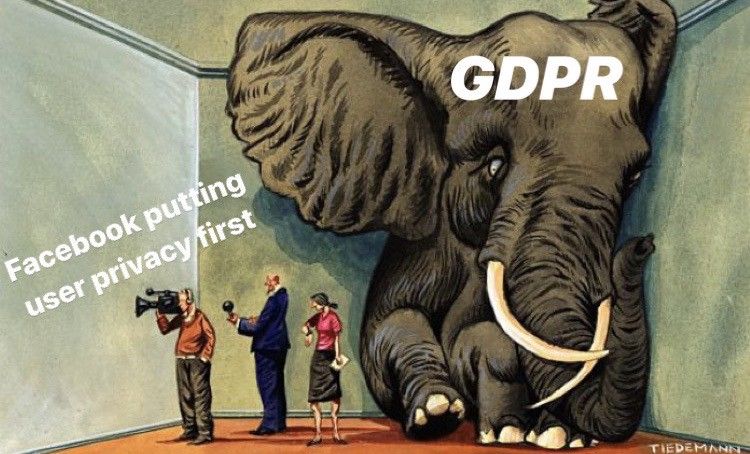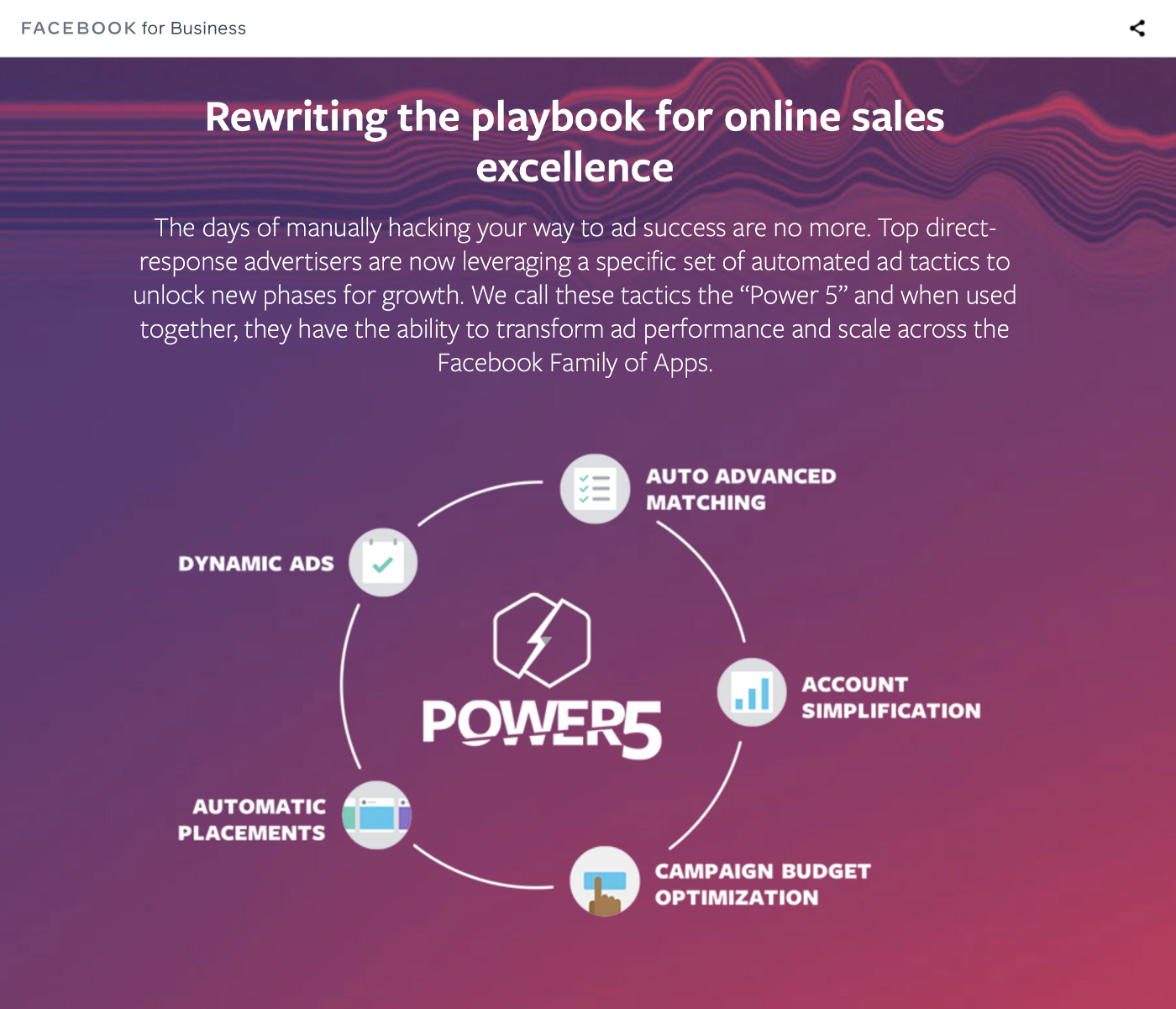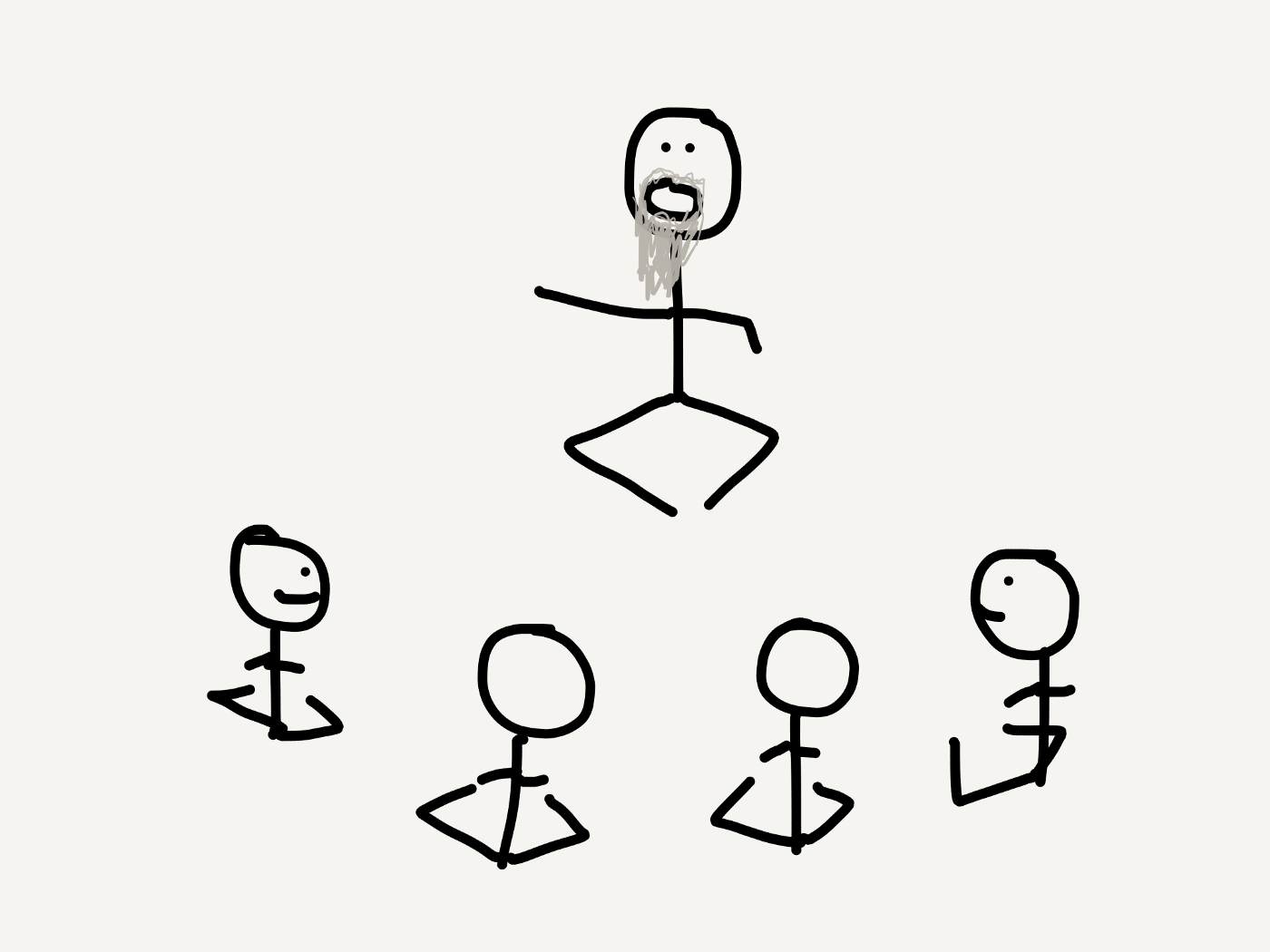For Facebook Ads, Creative Is All That Matters
January 5, 2020Say you want to grow a new DTC product you just launched on Shopify. Organic sales are on fire, and you’ve decided you’re ready to pour paid Facebook Ads on the flames.
The thing is, you have a limited amount of resources. In order to succeed, you need to be smart with where you focus your time, energy and money. With little to no experience running Facebook Ads, you head to the search bar and start opening tabs — reading how best to optimize conversions, automate bidding and build custom audiences. If this is you, stop what you’re doing.
In today’s Facebook paid advertising world, creative is all that matters. In fact, creative is the only thing that will meaningfully move the needle for your business and help you grow in the foreseeable future.
Before I try and convince you why this is, let me share the floor with some really smart people who have a strong POV on this subject matter.
Creative is insane. Running ads since Wednesday on two previously performing creatives that did great. Wed-Today= .80 ROAS. I'm like what the heck?
— Andrew Foxwell (@andrewfoxwell) April 6, 2019
Changed creative this AM. Same audiences: Today? 1.9 ROAS.
Creative. Every single time.
Creatives are more important than your audiences.
— Ads Alchemist (@AdsAlchemist) December 12, 2019
Anyone who says otherwise is wrong.
Fight me.
Creative trumps bidding strategies every time. https://t.co/aAXPziqBBC
— David Herrmann (@herrmanndigital) April 19, 2019
If you’re a DTC brand that’s ran ads successfully on FB from 2013 - 2018 and haven’t invested in a content team, you’re about to have a rude awakening. The way FB is going is the only place we can really make changes is on creative. Having STRONG content testing is 🔑 now.
— David Herrmann (@herrmanndigital) June 19, 2019
If you give the same ad account with the same creatives to 10 different Facebook ad experts, your bound to get very similar results. There’s no magic button or audience. Creative is the only variable that differentiates an ad account that can scale vs one that fails. #Facts https://t.co/0ly6ndz4Yo
— Savannah Sanchez | The Social Savannah (@social_savannah) October 13, 2019
Brands, say it with me:
— Jason Portnoy (@jasonportnoy) August 26, 2019
Creative. Creative. Creative. Creative. Creative. Creative. Creative. Creative. Creative. Creative. Creative. Creative. Creative. Creative. Creative. Creative. Creative. Creative.
That’s what us media buyers need to help you succeed. #ppcchat
From my own personal experience running Facebook Ads, there are three primary drivers for why creative is the ultimate end game for Facebook media buyers (and quite frankly, the best lever you have):
- Facebook is taking control of everything else
- Humans are better than machines at storytelling
- Good creative is harder to copy
Why Is Facebook Taking Control of Everything Else?
Privacy is forcing their hand
Let’s first address the elephant in the room.

There are a lot of eyes in Washington DC and across the world, staring down Mr. Zuckerberg. They’re circling 1 Hacker Way, grasping at anything they can to try and bring down the social media behemoth, before the social media behemoth brings them down. From where I sit, this looks like it’s a bit of a mismatch.
Sen. Hatch: "If [a version of Facebook will always be free], how do you sustain a business model in which users don't pay for your service?"
— CBS News (@CBSNews) April 10, 2018
Mark Zuckerberg: "Senator, we run ads." https://t.co/CbFO899XlU pic.twitter.com/bGKWks7zIk
Being the savvy (and ruthless) executive he is, Zuck has hidden behind the guise of “privacy” to make much needed changes to the company strategy. The data walls are going up, and while we’re being told this is to help with “privacy,” it’s actually going to help Facebook better position themselves for messaging and smaller groups.
Ben Thompson has coined a term strategy credit where, “doing the right thing is easy because it doesn’t actually hurt the underlying business.” He writes in a daily update:
Why, then, was Zuckerberg favorable towards the GDPR in his op-ed?
The reason is obvious: Facebook has already done the work, and wouldn’t it be nice if it could leverage that work elsewhere to regulations that only cement its positions, effectively doubling down on its advantage?
Unifying the backend of Facebook, Instagram, Messenger and Watsapp and encrypting messages ultimately means less data exiting the platforms. Because the walled garden is building bigger walls, there is going to be fewer and fewer ways in. This will result in less control for the companies building on top of the platform. They are already beginning to block all the old secret passageways that allowed companies like Cambridge Analytics to influence elections.
Facebook used to be open to sharing Order ID data and so much more, but now it’s become a one-way street where Facebook is demanding brands to share data with them to help improve advertisers’ performance, while claiming they can’t share any data back because of “privacy” concerns.
While Facebook may limit access to specific audience data, one thing is for certain: they need creative content that will keep bringing eyeballs back to the apps to sell ads against.
They have more data
Facebook has millions of data points across their family of apps. With this much data, Facebook thinks they are in better position to handle who you should target, which ads you should show, and how much you should bid in the auction.
And you can’t blame them, to be honest. I see countless media buyers talk about their wins after switching to more Facebook automation for their accounts.
Why do you think that you're smarter than Facebook's algorithm?
— Ryan Banks ☔️ (@Ryan12Banks) October 3, 2019
Trust me, you're not.
This is hands down the biggest mistake that I see in those newer to the platform.
Narrowing audiences, selecting specific genders, age ranges, etc.
Go broader, let FB do the heavy lifting.
You can already see the squeeze happening. Ask any Facebook rep or Facebook Ad Guru on Twitter, and you will see the push towards the Facebook Power 5.

Media buyers used to get an edge taking control of things in-house, but now those days are over. The old guard has been overthrown by powerful Machine Learning tools that Facebook invests billions of dollars into.
We have only ourselves to blame here. We have voluntarily been giving Facebook all of our data for the past decade. Then we give them our money to reach our own audience on their platform. This has allowed them to go hire the best engineers who have found unique ways to leverage the data and make Facebook Advertising one of the best advertising platforms in the world, with $FB currently sitting at a $595B market cap.
Facebook is also much better suited from a user identity perspective since they can tell who is who across the web. They have unique fingerprinting techniques that are years ahead of public knowledge. A lot of companies are not able to track customers across devices effectively, or see where they spend their time elsewhere on the web. Facebook can do this, which allows it to run better incremental lift tests since they can randomize audiences (nearly) perfectly.
The fact of the matter is, Facebook is slowly weening advertisers off of their old ways. You can see their endgame where it will be a requirement to play by their rules to get the results we’ve become addicted to.
Humans are better than machines at storytelling

Robots will beat humans at optimization games
It’s no secret that robots have been catching up and surpassing humans in mathematics. They’ve dethroned our chess masters, beaten us in Jeopardy and now taken the game of Go right from underneath our nose.
Despite all this, I have yet to see a robot win an Oscar, Pulitzer Prize or Grammy. Yes, machines have assisted us in our artistic endeavors but humans are still the ones laying the train tracks.
Humans are master storytellers. We have been forever and we will continue to be. It is this storytelling that helps set us apart from our machine counterparts.

Stories enable us to connect with other humans on a plane unknown to other species.
“How did Homo sapiens manage to cross this critical threshold, eventually founding cities comprising tens of thousands of inhabitants and empires ruling hundreds of millions? The secret was probably the appearance of fiction. Large numbers of strangers can cooperate successfully by believing in common myths.” — Yuval Noah Harari, Sapiens
Replace fiction with creative and empires with companies, and I think this still holds true. We can use creative stories to rally an Area 51 raid, turn an entire city into a set for Batkid, and elect a reality TV star as president of the United States.
Robots, as far as I know, don’t have empathy. Yes, there are going to be futurists in their garages trying to change this, but by golly I am not rooting for them! Because robots don’t have empathy, they can’t connect emotionally with humans. Emotions are often what drive our impulse decisions in the Facebook feed. Emotion is what makes for really good advertising.
Empathy and storytelling go hand in hand and are the key to making great creative that converts into sales. If Machine Learning robots are going to take the math side of media buying, then it is on us to lean into the creative side of things.
we’re finally passing the point where machines (algos, etc.) have become a better investment for future productivity gains than ppl. At this point, we’re better off spending our energy on creativity.
— scott belsky (@scottbelsky) September 9, 2019
Creative is harder to copy
Media buying has become a commodity
Unpopular opinion: media buying has become a commodity.
— Nik Sharma (@mrsharma) July 10, 2019
A brands' real differentiator is in their creative, their ability/agility to test new channels at scale and speed of execution.
Today, marketers, both online/offline are forced to think more creatively than ever before.
This is going to be hard for some people to hear, but it’s an unfortunate truth. In the past, media buying used to be a differentiated skill that only a handful of people could access. Think of TV media buying. If you wanted to access inventory, then you had to know somebody to call and then broker a deal.
Now, any mom and pop store can fire up a Facebook Ad account and click three buttons before being live with their first ad in Sri Lanka. All of this without talking to a single human.
Ben Thompson has called Facebook a super-aggregator because, “not only do they have zero transactions costs when it comes to serving end users, they also have zero transaction costs when it comes to both suppliers and advertisers.” This is what has made them one of the most powerful advertisers in the world.
Pair this with all the fantastic resources and courses out there, or even this phenomenal Twitter list to follow, and you can become a Facebook Ad Buying Expert in a weekend. No joke.
But while things seem bleak up until now, the shift to focus on creative should give you hope.
Unique value props are unique for a reason
What is core to your business will likely not be core to other businesses that are advertising on Facebook. This is a good thing. If you can focus your creative on unique value props, then you can really stand out and hopefully resonate with a specific audience.
Creative is seen by the end users
Users aren’t dumb. If they see one company doing something and the exact same ad from another company, they are probably going to call that company out. In fact, I have seen this on Twitter before with the Roman & Hims feud. The internet police are here to protect creators and generally can call BS on those that blatantly rip off ideas.
Video is heavier than most 1s and 0s
It’s pretty easy to copy text. I mean, you can click ctrl+c and ctrl+v and boom you have the same text. As for video, the files are bigger and there is more motion. Yes, we have our iPhones that are pretty darn good cameras, but video is still harder to get right. If you see a video you like, chances are its going to be tough to recreate it yourself.
Video creative is often the bottleneck for businesses. It’s not easy to create video content that works. There are better tools out there today to help (like Canva), but it still is going to come down to having a great creative team or agency helping you pump out content.
So…What you can do about it?
If you’ve made it this far, then most likely you are agreeing with my stance on creative. That’s all good, but I’m sure you are asking yourself, “what can we do about it?” Great question. The simple answer is to make better creative. But that is not easy, or else everyone would be doing it!
There are a few tactics that can help. The first is increasing your velocity and testing of creative. This means trying a lot of different iterations and ideas. A story I came across in a recent David Perell newsletter was about a ceramics class…
I’m reminded of a famous story about a ceramics class. On the first day, the teacher divided the class into two groups. The group on the left side would be graded solely on the quantity of work they produced, while the group on the right would be graded on quality:
“His procedure was simple: on the final day of class he would bring in his bathroom scales and weigh the work of the “quantity” group: fifty pound of pots rated an “A”, forty pounds a “B”, and so on. Those being graded on “quality,” however, needed to produce only one pot — albeit a perfect one — to get an “A.”
Well, came grading time and a curious fact emerged: works of the highest quality were all produced by the group being graded for quantity. It seems that while the “quantity” group was busily churning out piles of work — and learning from their mistakes — the “quality” group had sat theorizing about perfection, and in the end had little more to show for their efforts than grandiose theories and a pile of dead clay.”
Consistency develops ability, so pick a schedule and stick with it.
To come up with so many new ideas, you will most likely need to employ a rockstar creative team or partner with an all-star agency. This is not cheap. But again, it is necessary if you want to get the astronomical ROI on Facebook Ads you’ve heard about.
One other way to come up with new ideas is to borrow ideas from others. This doesn’t mean copying them straight up, but using them as inspiration. To do this you can head over to the Facebook Ad Library and see what any brand is running at a given moment in time.
This is a great resource but can be time consuming. An alternative to save you time? Tipster. Welcome to the world of content marketing folks. Join the Beta for Tipster to get inspiration for leveling up your Facebook creative.
creativity will be the #1 skill for marketers over the next 10 years
— Dave Gerhardt (@davegerhardt) July 1, 2019
New posts delivered to your inbox
Get updates whenever I publish something new. If you're not ready to smash subscribe just yet, give me a test drive on Twitter.